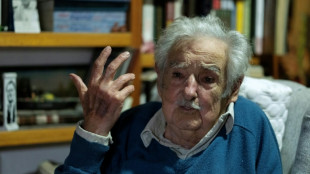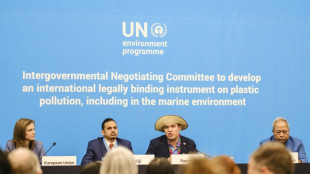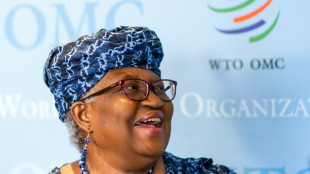
-
 Swiss unveil Euro 2025 mascot Maddli
Swiss unveil Euro 2025 mascot Maddli
-
Bears fire coach Eberflus after latest agonizing NFL defeat

-
 Rallies mark one month since Spain's catastrophic floods
Rallies mark one month since Spain's catastrophic floods
-
Arnault family's Paris FC takeover completed

-
 Georgian police stage new crackdown on pro-EU protestors
Georgian police stage new crackdown on pro-EU protestors
-
'We're messing up:' Uruguay icon Mujica on strongman rule in Latin America

-
 Liverpool dealt Konate injury blow
Liverpool dealt Konate injury blow
-
Van Nistelrooy appointed Leicester manager

-
 Verstappen brought back to earth in Doha after F1 title party
Verstappen brought back to earth in Doha after F1 title party
-
Global wine output to hit lowest level since 1961

-
 Norris boosts McLaren title hopes with sprint pole
Norris boosts McLaren title hopes with sprint pole
-
Big-hitting Stubbs takes satisfaction from grinding out Test century

-
 Romania recounts presidential ballots as parliamentary vote looms
Romania recounts presidential ballots as parliamentary vote looms
-
French skipper Dalin leads as Vendee Globe passes Cape of Good Hope

-
 Chelsea not in Premier League title race, says Maresca
Chelsea not in Premier League title race, says Maresca
-
Brazil's Bolsonaro aims to ride Trump wave back to office: WSJ

-
 France requests transfer of death row convict held in Indonesia: minister
France requests transfer of death row convict held in Indonesia: minister
-
'Mamie Charge': Migrants find safe haven in Frenchwoman's garage

-
 Iconic Uruguayan ex-leader hails country's swing left as 'farewell gift'
Iconic Uruguayan ex-leader hails country's swing left as 'farewell gift'
-
Thousands rally in Georgia after violent police crackdown on pro-EU protesters

-
 Shared experiences make Murray 'perfect coach', says Djokovic
Shared experiences make Murray 'perfect coach', says Djokovic
-
Iran, Europeans to keep talking as tensions ratchet up

-
 Inflation-wary US consumers flock to 'Black Friday' deals
Inflation-wary US consumers flock to 'Black Friday' deals
-
France shows off restored Notre Dame after 'impossible' restoration

-
 South African bowlers strike after Sri Lanka set big target
South African bowlers strike after Sri Lanka set big target
-
Namibia reopens polls after election chaos in ruling party test

-
 Georgia police arrest dozens in clashes with pro-EU protesters
Georgia police arrest dozens in clashes with pro-EU protesters
-
US stocks rise on Black Friday

-
 Leclerc on top for Ferrari in Qatar GP practice
Leclerc on top for Ferrari in Qatar GP practice
-
Jihadists, allies enter Syria's second city in lightning assault

-
 Amorim puts faith in Mount to turn around Man Utd career
Amorim puts faith in Mount to turn around Man Utd career
-
Guardiola will not 'run' from Man City rebuild

-
 Assisted dying campaigners, opponents rally at UK parliament
Assisted dying campaigners, opponents rally at UK parliament
-
Durable prop Healy set to carve name in Irish rugby history

-
 Macron unveils Notre Dame after 'impossible' restoration
Macron unveils Notre Dame after 'impossible' restoration
-
Traumatised Spain marks one month since catastrophic floods

-
 Yen rallies, euro up on rising inflation data
Yen rallies, euro up on rising inflation data
-
Attack-minded Spurs boss Postecoglou says: 'You'll miss me when I'm gone'

-
 Syria jihadists, allies shell major city Aleppo in shock offensive
Syria jihadists, allies shell major city Aleppo in shock offensive
-
Macron inspects 'sublime' Notre Dame after reconstruction

-
 Arsenal must be near-perfect to catch Liverpool, says Arteta
Arsenal must be near-perfect to catch Liverpool, says Arteta
-
Arrests, intimidation stoke fear in Pakistan's politics

-
 Showdown looms on plastic treaty days before deadline
Showdown looms on plastic treaty days before deadline
-
Ngozi Okonjo-Iweala: the WTO's trailblazing motivator

-
 WTO chief reappointed as Trump threat looms
WTO chief reappointed as Trump threat looms
-
US landmine offer to Ukraine throws treaty into 'crisis': campaign group

-
 British MPs debate contentious assisted dying law
British MPs debate contentious assisted dying law
-
Macron offers first glimpse of post-fire Notre Dame

-
 Syria jihadists, allies shell Aleppo in shock offensive
Syria jihadists, allies shell Aleppo in shock offensive
-
Japan government approves $92 bn extra budget


Legal marijuana, but Uruguayans still prefer black market
Uruguay was a pioneer in the legalization of recreational cannabis use, a move that helped to push many drug traffickers out of the domestic market.
But a bland and insufficient state supply has meant most consumers still prefer the diversity of the black market.
In 2013, Uruguay became the first country in the world to legalize recreational marijuana use -- which came into effect four years later -- even permitting its sale in pharmacies.
There are three legal ways for registered users to get hold of marijuana: purchasing it at pharmacies, through home growing for personal use, and by belonging to an official cannabis-producing club.
The most sought after legal method is membership of one of the 249 consumer clubs, which offer a greater variety to their 7,166 members than pharmacies do.
But many clubs have long waiting lists to join as they are limited by law to between 15 and 45 members.
Pulla, the treasurer and technical manager of a cannabis club in Montevideo -- who uses a nickname to avoid falling foul of the ban on promoting cannabis use -- explained that the waiting list "is an indicator that demand is not satisfied."
"Many more people want to access the legal market who still cannot," he said.
There are just over 14,000 registered home growers and another 49,600 people are registered to purchase marijuana at one of the country's 28 approved pharmacies at around $10 for five grams -- below the black market rate.
According to a study by the local IRCCA institute that regulates cannabis, only 27 percent of Uruguayan consumers buy their drugs through approved channels, a figure that reaches 39 percent when taking into account sharing with friends.
- 'Main objectives met' -
Joaquin, a cannabis user who purchases on the black market and goes by an alias, explained that one problem with the legal supply is the need to make an appointment at the pharmacy.
The black market is quicker and simpler. You "have a contact, talk to him and in the day, or the next day, coordinate and buy," he said.
Buying on the black market does not necessarily mean getting involved with dangerous drug traffickers, though.
Organized drug traffickers selling "Paraguayans", a cheaper quality marijuana imported from nearby Paraguay, represent just 30 percent of the illegal market, says Marcos Baudean, a professor at ORT University and researcher at the Monitor Cannabis project.
"There are many more domestic growers who are simply not registered" but have already overtaken trafficking networks in the sale of cannabis.
In that respect, "the main objective has been met: people can consume cannabis without needing to be linked with criminal organizations," said Daniel Radio, secretary general of the National Drug Board.
The perception of the illegal market has also changed.
Agus, 28 and using an alias, said she originally registered to buy cannabis from pharmacies but now acquires it on the black market while growing her own plants despite not being registered.
"I don't see it as the black market," she said. "It has good prices for what is sold and you don't feel like you're making use of drug trafficking."
There is "a friend or an acquaintance who passes you a contact from someone who has flowers and sells them."
Some people simply prefer to avoid registering, even though the information is used only for the study of consumption.
- Cannabis tourism 'potential' -
"The regulation of cannabis has been more effective than repression in terms of the blow to drug trafficking," explained Mercedes Ponce de Leon, director of the Cannabis Business Hub, a platform charged with developing the drug's ecosystem in the country.
However, Radio acknowledges that the black market preference of some users demonstrates limits to the current system.
Radio said users tend to be after a higher percentage of THC -- tetrahydrocannabinol, the main psychoactive substance in the drug, which is limited to 10 percent in the pharmacy product -- or more variety such as variants that produce different psychoactive effects.
"That conspires against the effectiveness of the system," said Radio.
The government now plans to increase the THC percentage and offer greater variety in pharmacies by the end of the year to attract more recreational consumers to the formal market.
Legalization, introduced by leftist guerrilla-turned president Jose Mujica, in power from 2010-15, created an industry of medicinal cannabis exports that have brought more than $20 million to Uruguay's economy since 2019.
Uruguay sells mainly to the United States, Switzerland, Germany, Portugal, Israel, Argentina and Brazil.
Although current center-right President Luis Lacalle Pou insists the legalization move was a mistake, the left-wing opposition wants Uruguay to go even further.
Currently reserved for residents, they want the market to be opened up to tourists.
"It's a simple formula: if tourism increases, spending increases, employment increases and investments increase. Models like that in California demonstrate the potential" for cannabis tourism, said Eduardo Antonini, an opposition politician and vice-president of the tourism commission in congress.
Other than Uruguay, 15 American states have legalized recreational marijuana use, as well as Canada.
J.Bergmann--BTB
